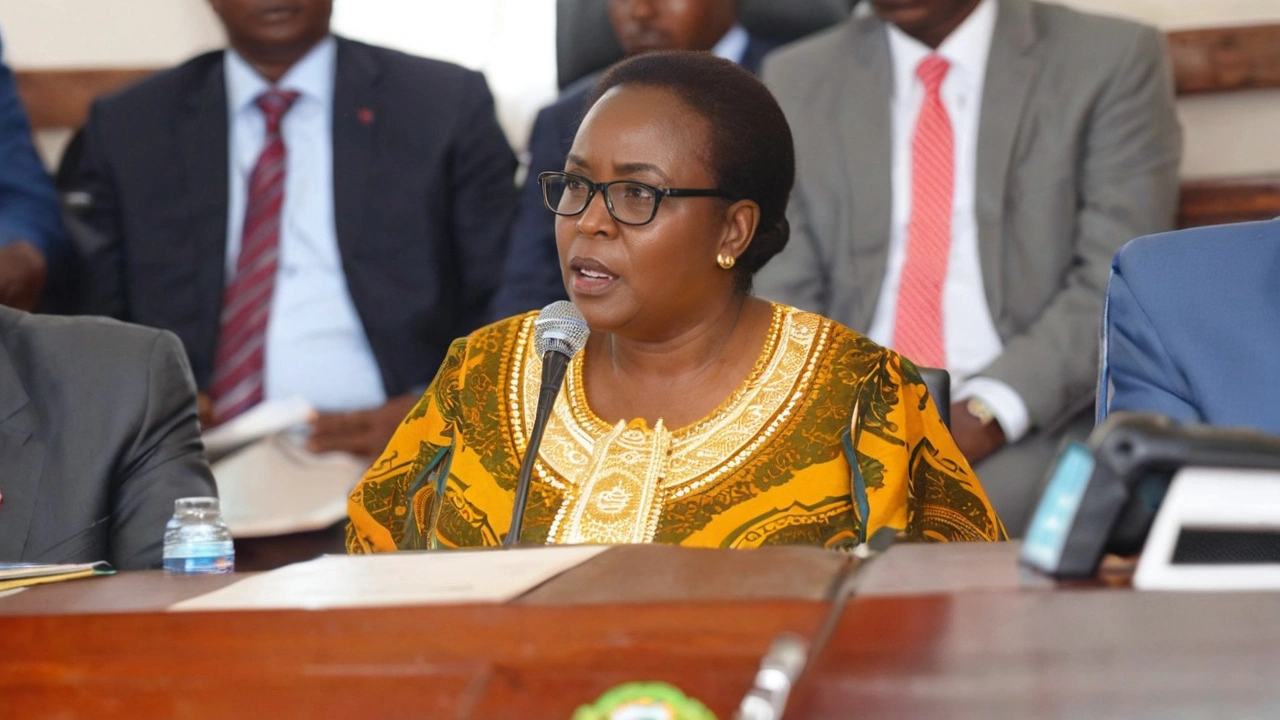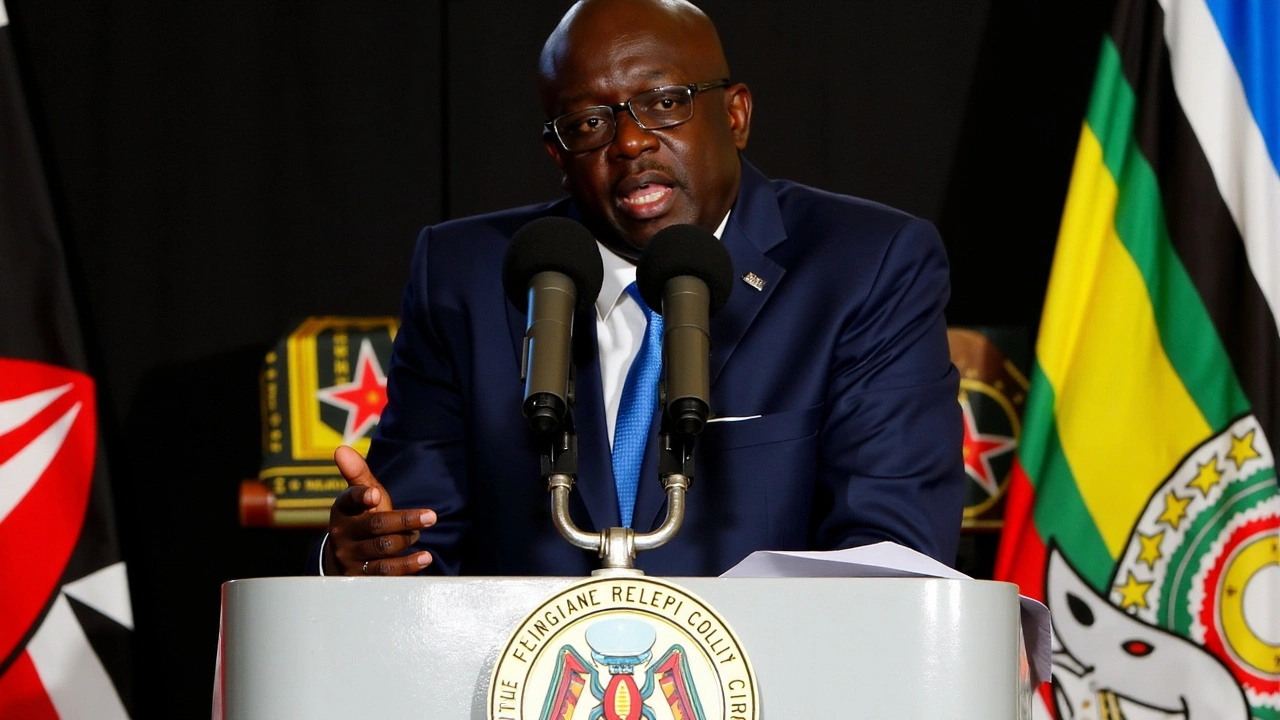Meru Governor Kawira Mwangaza Faces Third Impeachment
In a dramatic turn of events, Meru Governor Kawira Mwangaza has been impeached for the third time by the Meru County Assembly. The assembly passed the impeachment motion amidst heavy police presence and tension-filled proceedings, reflecting the deep divisions within the county government.
The impeachment motion, which was tabled by Nominated UDA MCA Zipporah Kinya, saw 49 out of 69 MCAs voting in favor, 17 opposing, and 3 abstaining. This overwhelming support for impeachment is indicative of the extent of dissatisfaction with Governor Mwangaza's tenure.
Allegations Against Governor Mwangaza
The allegations leading to the governor's impeachment are both serious and varied. They include accusations of gross violation of the Kenyan Constitution, violations of both national and county laws, and abuse of office. Among the more notable accusations is the claim that Governor Mwangaza misled the public regarding funds raised for the family of Daniel Muthiani alias Sniper, a murdered blogger. This particular allegation has resonated deeply with the public, drawing widespread condemnation.
Additionally, the governor is accused of irregularly paying emergency call allowances to doctors and medical officers, which allegedly amounts to financial mismanagement. Another point of contention is the use of a manual payroll system by the Governor’s Office, a move seen as retrogressive and prone to misuse.
Employment practices within the Governor’s Office have also come under scrutiny. Governor Mwangaza is alleged to have maintained a bloated workforce, making illegal appointments and dismissals without following proper procedures. This has exacerbated tensions within the county government, casting a shadow over her administration.
Perhaps more critically, the governor faced accusations of failing to appoint heads for key county corporations such as the Meru County Development and Investment Corporation and the Meru Microfinance Corporation. This failure has been linked to poor revenue collection and inadequate health services, issues that have greatly affected the county's development.
Support and Opposition
The impeachment motion received backing from both the Majority Whip Jim Muchui and the Minority Whip Mwenda Ithili. The supporting MCAs were vocal in their criticism of the governor's handling of county affairs, highlighting the negative impacts on revenue collection and health service delivery. Their support underscores the bipartisan call for greater accountability within the county's leadership.
However, the process has not been without its detractors. Seventeen MCAs, staunch defenders of Governor Mwangaza, have spoken out against the impeachment. They questioned the legitimacy of the process, alleging that it was driven by political sabotage rather than genuine grievances. Their perspective adds a layer of complexity to an already contentious issue, highlighting the political undercurrents at play.
The Legal and Political Landscape
It's worth noting that this marks the third time Governor Mwangaza has faced impeachment, with two previous attempts being halted by the Meru High Court. Despite a pending court case, the County Assembly deemed the current motion legally proper, and Governor Mwangaza was invited to defend herself. Unfortunately, she did not respond to the invitation, which has only fueled the fire of controversy surrounding the process.
The impeachment process itself was not without drama. The assembly session was conducted under heavy police presence, a clear indication of the heightened tensions. A brief scuffle occurred when MCAs allied with Governor Mwangaza attempted to gain entry, underlining the deeply polarized nature of the current political climate.
As the impeachment moves to the Senate for consideration, the future of Governor Mwangaza hangs in the balance. The Senate's review will be a critical next step, determining whether the charges against her warrant removal from office. This process will be closely watched not just in Meru, but throughout Kenya, as it could set a precedent for how allegations of misconduct and legal violations are addressed at the county level.
Implications for Meru County
The political wrangling and resultant instability have significant implications for Meru County. Governance disruptions often translate to stalled projects and services, adversely affecting the local population. Already, there are concerns about reduced efficiency in revenue collection and the provision of health services, which are vital to the community's well-being.
The allegations of misuse of funds and irregular employment practices, if proven, signal deeper administrative flaws that could have long-term effects on the county's development. Residents are likely to feel the impact through delays in infrastructure development, healthcare services, and other critical community projects.
The impeachment also brings to light the broader challenges facing county governance in Kenya. Issues such as accountability, transparency, and adherence to legal and constitutional mandates are not unique to Meru. As such, this case could serve as a crucial case study for other counties dealing with similar governance issues.
The Role of Public Perception
Public perception plays a significant role in political outcomes, and this situation is no different. The allegations against Governor Mwangaza, especially those involving financial mismanagement and misleading the public, have eroded trust in her administration. The support for the impeachment motion among MCAs can be seen as reflective of broader public sentiment.
However, the accusations of political sabotage leveled by her supporters paint a picture of a deeply divided political environment. It suggests that personal and political animosities may also be at play, complicating the narrative of governance and accountability. For the public, distinguishing between legitimate grievances and political maneuvering becomes a challenging task.
Looking Ahead
As the situation develops, all eyes will be on the Senate's review process. The outcome will not only decide the future of Governor Mwangaza but also serve as a litmus test for governance standards in Kenyan counties. If the Senate upholds the impeachment, it could pave the way for more stringent oversight and accountability measures across the country.
Conversely, if the Senate dismisses the impeachment, it could raise questions about the effectiveness and legitimacy of the impeachment process itself. Either way, the case will likely influence how county assemblies handle similar situations in the future.
In the meantime, the people of Meru County are left to navigate the uncertainties brought about by this political upheaval. For many, the hope is that whatever the outcome, it leads to a more transparent and accountable government that prioritizes their needs and development.








sachin p
August 8, 2024 AT 21:03Seeing the dynamics in Meru reminds me of how local leadership can echo broader cultural narratives across Kenya.
sarthak malik
August 8, 2024 AT 23:50The impeachment process outlined includes a vote count of 49‑17‑3, meaning a clear majority supported the motion; this detail underscores the assembly's stance.
Nasrin Saning
August 9, 2024 AT 05:23While the situation is tense it also shows how public trust can shift when officials are seen as mismanaging resources
gaganpreet singh
August 9, 2024 AT 13:43The pattern of repeated impeachments raises questions about institutional accountability, which should be a cornerstone of any democratic system. Each successive attempt signals not just political rivalry but also a possible erosion of procedural norms that safeguard against abuse. The governor's alleged misdirection of funds for the Sniper family reflects a breach of fiduciary duty that many citizens find intolerable. Moreover, the irregular payment of emergency call allowances to medical staff signals a distortion of public service incentives. The manual payroll system introduced by the governor could be viewed as a step back from modern financial transparency. When a public office inflates its workforce without clear justification, the strain on the county budget becomes evident. The failure to appoint heads for key county corporations compounds this issue, leaving essential services without strategic direction. Revenue collection suffers when oversight mechanisms are weak, and health services deteriorate as a result of misallocation. The bipartisan support from both majority and minority whips reinforces the notion that the concerns transcend party lines. Political sabotage claims, while occasionally valid, should be substantiated with concrete evidence rather than rhetorical flourishes. The heavy police presence during the assembly session highlights the volatility of the environment, yet it also raises civil liberty considerations. A scuffle among MCAs attempting entry underscores how polarized the atmosphere has become. The Senate's forthcoming review will act as a crucial checkpoint, ensuring that due process is respected. If the Senate upholds the impeachment, it could set a precedent for stricter oversight in county governance across Kenya. Conversely, a dismissal could prompt a reevaluation of how impeachment mechanisms are employed, perhaps calling for reforms to prevent political weaponization.
Urmil Pathak
August 10, 2024 AT 00:50What exactly does "manual payroll" mean here? Does it involve paper forms instead of digital systems?
Neha Godambe
August 10, 2024 AT 14:43From a governance standpoint, the misallocation of funds is unacceptable and demands immediate corrective measures; the county must prioritize transparent budgeting to restore confidence.
rupesh kantaria
August 11, 2024 AT 07:23In the realm of political philosophy, one contemplates whether repeated impeachments reflect a healthy democratic corrective or a destabilizing cycle that undermines institutional continuity; the answer perhaps lies in the underlying due proceeeds which, if rigourously adhered to, render the process both just and necessary, though occasional typso may ocassionaly slip through the cracks in such complex discourse.
Nathan Tuon
August 12, 2024 AT 02:50Encouraging responsible leadership is vital; community members can stay informed and hold officials accountable through civic engagement.
shivam Agarwal
August 13, 2024 AT 01:03It is noteworthy that the governor's office has struggled to fill key positions, leading to gaps in service delivery. This oversight affects everything from infrastructure projects to health initiatives. The community feels the impact daily, especially in rural areas where access to medical care is already limited.
MD Imran Ansari
August 14, 2024 AT 02:03Wow, what a rollercoaster! 🎢 The whole impeachment saga reads like a drama series, complete with cliffhangers and unexpected twists! 🌟
walaal sanjay
August 15, 2024 AT 05:50Honestly, this whole mess is a clear example of political opportunism, a blatant attempt to undermine local governance, a betrayal of public trust, and an affront to constitutional principles!!!
Umesh Nair
August 16, 2024 AT 09:53maybe its not just opportunism its also about power struggles inside the party, i think we should look beyond the headlines and question the motives behind every move
kishore varma
August 17, 2024 AT 14:13Politics can be wild 😂
Kashish Narula
August 18, 2024 AT 18:50Indeed the trust factor is crucial; however, we must also consider that rapid judgments can sometimes overlook nuanced realities-let's keep the conversation balanced, okay?